Amplitude has done the impossible several times. They’ve pioneered a remarkably effective internal kick-starter alternative in Games2Gether, they’ve entered into the 4x genre with not one, but two incredibly robust and satisfying experiences, and they’ve created a rich, and fascinating world that’s excellently positioned to deliver unique experiences in a number of genres. Their games are an excellent example of genre differentiation, and yet manage to maintain a vital thread of connection with each other that allows for a familiarity across genres.
[youtube]https://youtu.be/Vh1JIM5Ymps[/youtube]
Amplitude is responsible for the Endless universe. To date there are three titles in that universe: 2012’s dark horse strategy hit Endless Space, and 2014’s Endless Legend and Dungeon of the Endless. Both Endless Space and Endless Legend are classified as 4x strategy titles – a genre dominated for most of its existence by the wildly popular Sid Meier’s Civilization franchise. The 4X genre was defined by Alan Emrich of Computer Gaming World in a review of Master of Orion, and those four Xs refer to eXplore, eXpand, eXploit, and eXterminate, and are an excellent way of breaking down the game-play to its most essential elements.
The utter domination of the 4X genre by the Civilization series is difficult to argue – there’s no question they hold the dominant spot, and there’s little question that they deserve it. Civilization has always walked an amazingly thin line between great depth and accessibility, and so many of the other titles vying for the crown have fallen far on both sides of that tightrope. I would have been hard pressed to name a 4X title that managed to deliver as deep, rich, and detailed an experience in a manner that wasn’t intimidating to the point of utter frustration. I would have been, and was. And then I played Endless Legend.
4X titles are notoriously complex, and require a thorough understanding of the mechanics and factions in order to be anything beyond a total failure, and as such, there’s a certain element of make-or-break with the presentation that determines whether you’re going to commit to learning it, or not.
My first experience with the Endless universe was Endless Space. The title came highly recommended, and I was very attracted to the Games2Gether system responsible for its funding. I’m not sure, frankly, if Endless Space was structured in a manner I found intimidatingly complex, or if I simply didn’t have to time or patience to sit down and learn it, but while the attention to detail, complexity, and unique nature of the universe were readily apparent, Endless Space never really grabbed me. I’m fully willing to accept that might have had as much or more to do with me as it did the title, but the fact remains that’s not an outcome that a developer is seeking, that’s a situation that I’m sure they’d prefer to avoid. You can do that in any genre, no matter how complex, with an excellently handled tutorial.
There are no such issues with Endless Legend. The presentation is significantly if subtly improved from its spiritual predecessor, and the title does its best to keep you on track with constant but highly customizable notifications that allow you to control the precise level of hand-holding you require. Endless Legend is the first new 4X title I’ve really played in a long time. To clarify that, it’s the first one I’ve continued to play after I felt I did my due diligence to the title. It’s the first one I’ve played to play in years. It makes it very easy to climb back into the saddle, and it does a great job of keeping you there.
First things first: it’s beautiful. The art style, artwork, audio and music are startlingly beautiful, and will continue to surprise you hundreds of hours into the title. It’s difficult to express what an excellent job has been done with the artistic elements of this game, and I will not belabor the point. It is simply gorgeous on every artistic level it could possibly be.
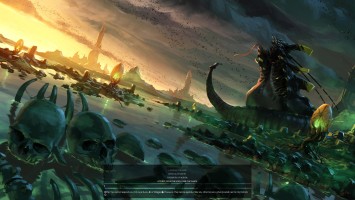
While Endless Legend is quite thoroughly rooted in the 4X genre, it isn’t content to simply polish the current boundaries of the genre to a fine sheen; it does so and then layers in some beautifully thought out RPG elements and refines the combat in a deeper manner than previous entrants in the genre.
Endless Legend takes place during a time of high fantasy in the Endless universe, on the planet of Auriga. The factions and creatures are immediately recognizable to any fan of high fantasy, but all of them have the twist we’ve come to expect from Amplitude. The Necrophage faction is a disconcertingly insectile undead race bent on conquering – and consuming – all they encounter. As such, they suffer serious diplomatic penalties with minor and major factions alike, and are primarily suited to victory by elimination. Each of the factions has an in-fiction motivation that is directly tied mechanically to their traits, and that serves to reinforce and realize the world of Auriga in a manner few 4X titles can achieve.
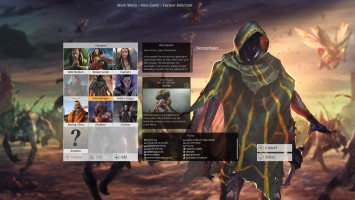
Another manner in which Endless Legend serves to distinguish itself from its competitors is a more strategic combat system – each army, and each reinforcing army can be controlled manually in battles, allowing a clever, strategic commander to succeed against heavier odds, something that is sadly lacking in a great many 4X titles. The combats take place on a hex grid placed directly on the map, allowing for clever use of range, positioning, reinforcement, and terrain. If you’re not interested in that level of micro-management you can automatically resolve all battles in the mode of other 4X titles.
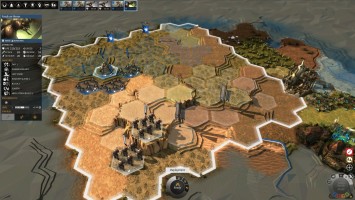
One of Endless Legend’s great strengths is the commitment made by Amplitude to truly marry the 4X to a fantasy world, and while there are countless examples of this, perhaps the biggest and best of these choices was the Quest Victory. Traditionally, 4X games are won by conquering all of your adversaries, converting their territories through cultural or diplomatic means, out-researching all of your competitors, or creating an unparalleled economic empire. More often than not, it comes down to who does a better job approaching one of these victories by the games’ designated end; points are assigned and totaled, and a winner is determined.
Endless Legend adds to this formula in a delightfully appropriate manner: each race is given a series of quests to complete, tailored to the racial narrative, and this does a great deal to flesh out the identity of the group in question – one of the major weaknesses of most 4X titles is that the choice of race at the top of a match has little major impact on the title beyond a few innate bonuses and the visual design of the units and cities. Endless Legend does an amazing job of making the choice of race relevant on every level, and telling each faction’s story in a rich and engaging manner.
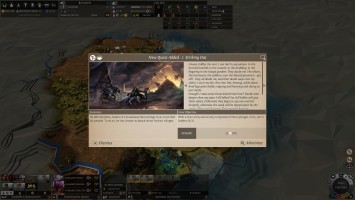
Another of the potential great weaknesses of the 4X genre is the tendency towards repetitiveness – frequently there is a first best strategy for every faction, and that tends to steer every game in the same direction. Endless Legend allows for the creation of custom units, the ability to equip both heroes and units with a wide variety of equipment with a similarly wide range of abilities, and the ability to assimilate a wide range of minor factions into your empire, gaining access to their unique units. This allows for an amazingly deep level of customization at almost every level of your unit, and gives you the ability to play every faction exactly how you want to. It’s the least restrictive and most creative 4X system I’ve ever seen.
Another welcome addition is the ability to queue up production in an almost endless manner. As long as the research tier is unlocked, or the building, there’s no queue restriction. This is incredibly useful for the min-maxer that suffers from absent-minded professor syndrome, and I speak from personal experience. It can, however, result in 1 turn in 20 where you’re stressfully sweating over options, and 19 out of 20 wherein you just press End Turn.
Ultimately, the most exciting thing to me about Endless Legend is that I have played three games approaching 50 hours each and I’ve learned something new about the game roughly every five minutes. That’s a combination of incredibly daunting and incredibly exciting, but what really blows my mind is that I want to play more. It’s the best possible combination of RPG and 4X; it’s incredibly rewarding, and amazingly addictive.
However, it’s not all rainbows and butterflies – I’ve stumbled across a fair number of bugs in my time with the title, but thankfully most of them are minimal. I’ve had some confusing situations involving the Diplomacy mechanic wherein I will offer peace to a faction which will refuse it and then immediately offer a peace treaty in return. There seems to be either a bug surrounding reinforcement mechanics or an incredibly arcane rule-set in place that could do with some explanation.
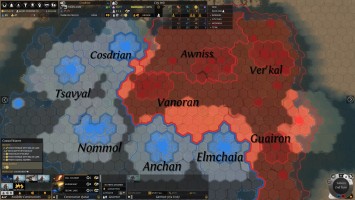
Finally, and in bewildering opposition to the otherwise flawless UI mechanics, there isn’t a mini-map in a very map intensive title – and while it’s certainly true that you can simply scroll out far enough and see the entirety of the known map, there are situations in which this is somewhat inconvenient. But the simple fact is, that’s my only complaint. And that is an amazing achievement in game development.
I cannot say that I would unequivocally recommend Endless Legend but that is not a failing of the title itself. The simple truth is that there’s a massive subset of the gamer populace that won’t be willing to put in the time to learn it. But I cannot imagine a single fan of the 4X franchise that won’t love it. Furthermore, if you have even a vague interest in the 4X genre, or in the game, I highly recommend it – it’s an excellent point of entry into the genre.
Interested in more? Check out Pixelated Geek’s PXL Plays! Endless Legend!
[youtube]https://youtu.be/tvH_htihBl8[/youtube]